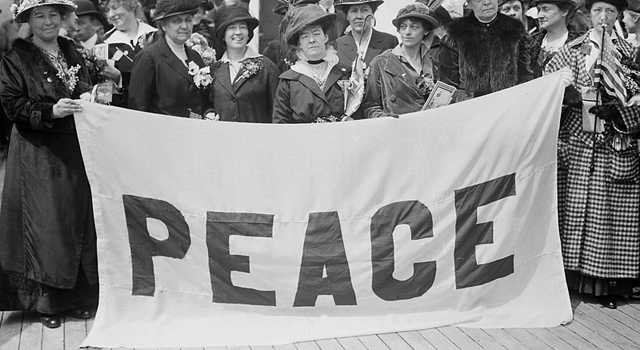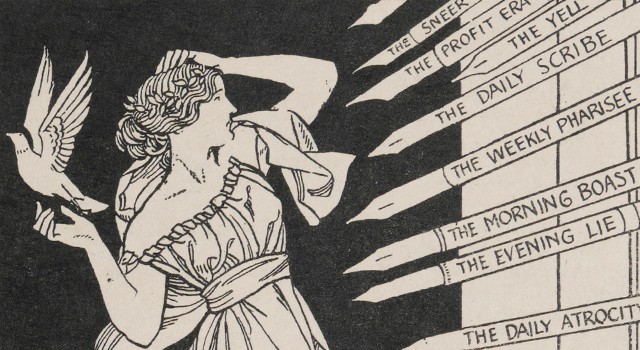Articles
One Comment
By Voices
On 03, Nov 2014 | One Comment | In Cities | By Voices
Manchester’s Voices of Peace
Marcus Morris, Manchester Metropolitan University
Patriotic rallies, songs and flag waving, along with long lines of men volunteering to fight, are images that we traditionally associate with the outbreak of war in August 1914. A patriotic fervour and war fever seemingly gripped the nation, with whole cities turning out to cheer on their boys and show their support for Britain’s war effort. Yet this was by no means the only response to the growing threat of war or upon its outbreak, even if we are much less familiar with these images.
Particular examples of isolated voices of peace may be recollected, perhaps most famously the Labour-led demonstration held in Trafalgar Square on 2 August, where Keir Hardie and others made impassioned pleas for peace. That such demonstrations were held all over the country often remains a surprise though. Certain cities, moreover, spoke with a louder voice in their calls for peace and here we focus on one of those, Manchester.
The Manchester Guardian had been publishing critical editorials of the government’s policy in Europe and had led a campaign for Britain’s neutrality during the tense summer months of 1914. With the tension growing it became one of the leading anti-war publications in the country, daily publishing letters from across Britain supporting its position, while setting the tone for the city where it was published. As early as 25 June, a protest was held in the city against the growth of armaments and associated threat of war. With the prospect of war looming ever larger, the Guardian noted that ‘evidence grows that public opinion is becoming shocked and fearful at the thought that this country could be dragged into the horrors of a general European war’, while local dignitaries also raised voices in protest. The Lord Mayor of Manchester commented that ‘one can only hope that a calamity so terrible as our being drawn into this trouble will be avoided’ and the President of the Manchester Chamber of Commerce came out publicly against Britain’s involvement in any way.
Local suffrage societies, local political parties, and the city’s labour and socialist groups, also consistently warned their fellow citizens of the dangers of the escalating tension and called for public peace demonstrations. Indeed, a series of these were held in central Manchester, even after war had been declared. On 4 August, the local branch of the British Neutrality League held a demonstration attended by over two thousand people. The next day a united churches and labour meeting against the war was attended by even more. Clearly many in the city did not welcome war and were neither overwhelmed by war fever nor patriotic fervour. Why, then, were so many in Manchester raising their voices in the name of peace?
![Women's Peace Conference, 1915 [Creative Commons]](http://www.voicesofwarandpeace.org/wp-content/uploads/2014/11/wikicc-peace-conf-1915-800.jpg)
It is no surprise that there were many reasons that inspired Manchester’s peace campaigners. Female campaigners tended to focus on the loss, the unknown horrors of war and the cavalier way in which men disregarded these, whilst also arguing that the burdens of war would fall disproportionately on Britain’s women. City dignitaries’ concerns were primarily economic and focused on the effects that the inevitable downturn in trade would have on the city, one prominent merchant commenting that ‘it is needless to say that it would be most disastrous to British interests and British commerce in every way’. Labour and socialist groups saw this as just another means by which the workers would be oppressed, doing the bidding of exploitative masters who had caused the tension through their secret diplomatic games.
There were also concerns that were shared across the different campaigners, uniting groups in Manchester that would normally be in opposition. The desire for Britain to remain neutral was overwhelming; this was a quarrel that was not ours and one that our government should not be dragging us into, whatever alliances may exist. One correspondent to the Guardian put this particularly forcefully: ‘England must remain neutral, first and foremost because war at the best of times is not only a calamity but an outrage on humanity, and because in this particular case that outrage would be aggravated by the total absence of justification’. The arguments generally given for Britain’s involvement saw particular ridicule, especially the desire to maintain the balance of power, which was seen as outdated and irrelevant. One striking aspect of all the peace campaigns in Manchester was that they spoke positively of Germany and believed that if any country was our enemy, it was the oppressive Russians: ‘I should say that if there is one country in the world with which we should not be allied it is Russia’.
![Fables and Illustrations by J. Southall [© Reproduced with permission of the Barrow Family. Birmingham Museums: 1978P198]](http://www.voicesofwarandpeace.org/wp-content/uploads/2014/10/1978p198-10-500.jpg)
Even once Britain was at war, there were thousands in Manchester prepared to raise their voices in the name of peace. By no means was it the only city in Britain to raise its voice, but it does seem to have raised its voice particularly loudly and in greater unison than most other cities. A Liberal tradition, strong labour movement, a strong female voice and an economically-minded elite all played a part in this. We sometimes hear the voices of peace, mainly from later in the war, but the voices of war and patriotism are often heard much louder, especially at its outbreak. This is understandable and was certainly the message propagandists wanted to sell at the time. Yet for certain communities, Manchester among them, the dominance of a patriotic war fervour should not be overplayed. Of course, there were fluctuations in this throughout the war as Britain’s fortunes rose and fell. Ultimately, the ever-growing tensions and the outbreak of war brought a number of responses, with disparate voices of peace and war all clamouring to be heard.
Submit a Comment





Comments